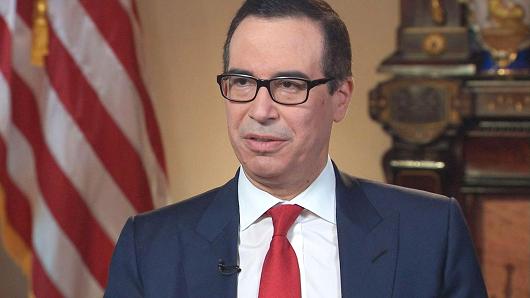Trump, Mnuchin and the Republicans Apparently Don’t Believe in Arithmetic Either
You have to love this, even as you gnash your teeth. It is a perfect example of the Trump administration at work—or whatever passes as work. And it comes just as House and Senate Republicans say they have reached agreement on a final tax bill that cuts taxes for the wealthy while claiming to help middle-class Americans.
On Monday, after months of saying that more than 100 people in his agency were “working around the clock” to calculate how much additional growth would come from the tax bill, Treasury Secretary Steve Mnuchin showed off the work.
And it simply asserts that the plan to poke a $1.5 trillion hole in the federal deficit will pay for itself.
It’s a perfect encapsulation of a presidency that insists pulling out of climate change agreements will leave the world better, that eliminating consumer and environmental regulations will improve our economy and wages, that dropping millions of people from healthcare insurance will make us healthier. So, sure, spending $1.5 trillion will pay for itself.
So, the “analysis” of all the issues that will affect every American has virtually no analysis of how to pay for the tax changes in question.
Even better, the proposal relies on these two big assumptions: that the tax bill will generate economic activity well beyond what independent analysts project, and that the rest of the administration’s economic agenda, including regulatory change, infrastructure spending and an overhaul of the welfare system (read Social Security, Medicare and Medicaid), will take effect.
Mind you, lots of independent analysts say it ain’t so.
Based on that, congressional financial hawks are planning to cut Social Security, Medicaid and Medicare next.
The Treasury’s Office of Tax Policy says the U.S. economy would increase from 2.2% annual growth to 2.9% annual growth every year for the next 10 years.
By contrast, the non-partisan Congressional Budget Office is projecting just 1.9% growth per year. The Joint Committee on Taxation (JCT), Congress’s nonpartisan scorekeeper, predicted that the Senate tax bill would add about 0.1% more a year to growth over the next decade. JCT took into account the economic effects of the tax cuts to individual and business taxes, but not other policy changes advocated by the administration.
Treasury says half of the increased growth would come from massive cuts to business taxes, from 35% to 20%, on paper at least; few companies pay the full 35%. Treasury attributes the rest to several factors: more infrastructure spending, welfare reform, an overhaul of the individual tax code and lower rates for business owners who pay their income taxes through the individual code.
The one-page analysis says, “We expect the other half to come from changes to pass-through taxation and individual tax reform, as well as a combination of regulatory reform, infrastructure development and welfare reform as proposed in the (Trump) Administration’s Fiscal Year 2018 budget.” All in, Treasury said the changes and other policy efforts would lift economic growth so much that it would generate $1.8 trillion in new revenue over 10 years, as a bigger economy leads to bigger tax bills.
The JCT says the bill’s total cost would remain $1 trillion after considering growth effects.
There was no supporting documentation with the Treasury statement, making comparisons impossible.
The nation’s leading think tanks that analyze tax and budget policies have all released detailed analyses showing that the tax bill would not fully pay for itself.
In a new analysis of the Senate GOP tax bill also released Monday, the Tax Policy Center found that the bill would still cost $1.5 trillion, even after taking into account economic growth. The Penn-Wharton Budget Model predicts that the tax measure would still add $1.5 trillion to $1.8 trillion to the national debt after factoring in growth.
The Tax Foundation, which supports the GOP tax plan, says it would cost about $500 billion. Treasury is by far the most optimistic, adding, “We acknowledge that some economists predict different growth rates.”
Sen. Bob Corker (R-Tenn.) voted against the tax bill because of concerns about how much money it would add to the deficit. The White House has tried to assure other GOP lawmakers that the Joint Committee on Taxation is wrong and that the bill would not increase the debt.
Senate Minority Leader Charles E. Schumer (D-N.Y.) called the analysis “fake math.”
I guess it’s not just science that Trump hates. He must hate math, too.
Terry H. Schwadron is a former editor for The New York Times, The Los Angeles Times and The Providence Journal and is an active volunteer with immigrants and writers and plays trombone in New York City. He blogs here.




